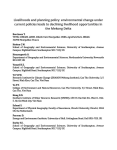Berchoux T., Hutton C., Hensengerth O., Voepel H.E., Tri V.P.D., Vu P.T., Hung N., Eslami S., Parsons D.R., Darby S.E. (2022). Livelihoods and planning policy: environmental change under current policies leads to declining livelihood opportunities in the Mekong delta. SSRN, 17/03/2022, online, p. 1-31.
https://doi.org/10.2139/ssrn.4059785
https://doi.org/10.2139/ssrn.4059785
| Titre : | Livelihoods and planning policy: environmental change under current policies leads to declining livelihood opportunities in the Mekong delta (2022) |
| Auteurs : | T. Berchoux ; C. Hutton ; O. Hensengerth ; H.E. Voepel ; V.P.D. Tri ; P.T. Vu ; N. Hung ; S. Eslami ; D.R. Parsons ; S.E. Darby |
| Type de document : | Article |
| Dans : | SSRN (online, March) |
| Article en page(s) : | p. 1-31 |
| Note générale : | Preprint |
| Langues : | Anglais |
| Langues du résumé : | Anglais |
| Catégories : |
Catégories principales 05 - DEVELOPPEMENT RURAL ; 5.1 - DéveloppementThésaurus IAMM MENAGE AGRICOLE ; ECONOMIE DE SUBSISTANCE ; AGRICULTURE DE SUBSISTANCE ; COMMUNAUTE RURALE ; APPROCHE PARTICIPATIVE ; MODELE DE SIMULATION ; PLANIFICATION AGRICOLE ; FUTUR ; SCENARIO ; PARTIE INTERESSEE ; CHANGEMENT CLIMATIQUE ; DURABILITE ; UTILISATION DES TERRES ; DEVELOPPEMENT TERRITORIAL ; DELTA ; VIET NAM |
| Résumé : | The Mekong Delta faces significant challenges in sustainably supplying Vietnam and its export market countries with agricultural commodities, while ensuring livelihoods and providing living space to its growing population in the context of climate change and the country’s agrarian transition. Anthropogenic factors, such as the construction of dykes to control river flooding, the further development of triple-cropping rice production, and infrastructure development, when combined with climate change impacts on sediment and water availability, are all combining to threaten sustainable agricultural production and consequently livelihoods. One of the key challenges in sustainable development is the need to identify plausible future states of agricultural-based socio-ecological systems which draw upon differing strategies of land management, and to characterise the impacts of these systems on both the landscape and livelihoods. Founded on participatory rural appraisals in agriculture-based communities and workshops with local and national stakeholders, here we simulate three alternative Mekong Delta futures: two arising from the key development orientations as found in policy decisions; and one arising from a focus on livelihood-based development. These three scenarios were used to estimate likely changes of agricultural outputs and different services of land use systems. It was hypothesised from the literature and participatory rural appraisals that each land system can only provide livelihoods to a certain number of households, which was further demonstrated using binomial regressions. Future land system changes driven by scenarios of climate change (RCP 4.5) and current policies were generated using a spatially explicit and dynamic land system change model. The estimated impacts of our modelling of each scenario on the provision of livelihoods and ultimately poverty indicate that more diversified land systems support greater livelihood opportunities. We find that current policies have potentially conflicting goals. Decisions driving towards intensive farming risk triggering rural unemployment and outmigration, potentially exacerbating urban poverty in major cities such as Can Tho and Ho Chi Minh City. On the other hand, decisions aiming at increasing environmentally-sound agricultural systems and diversity can help secure more livelihood opportunities. The results indicate that spatial planning policies relying on a broad-based assessment of land system services, including livelihood and environmental impacts, are needed to ensure sustainable development of rural territories. |
| Cote : | Réservé lecteur CIHEAM |
| URL / DOI : | https://doi.org/10.2139/ssrn.4059785 |







